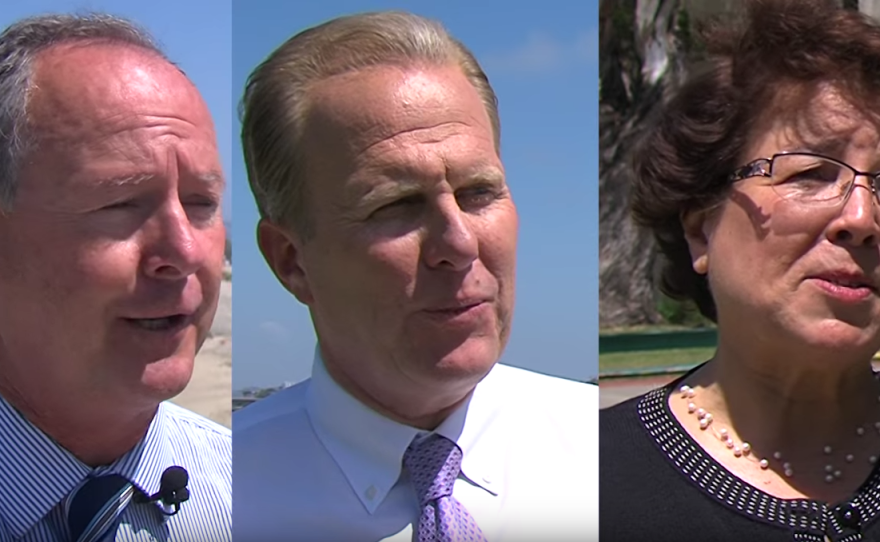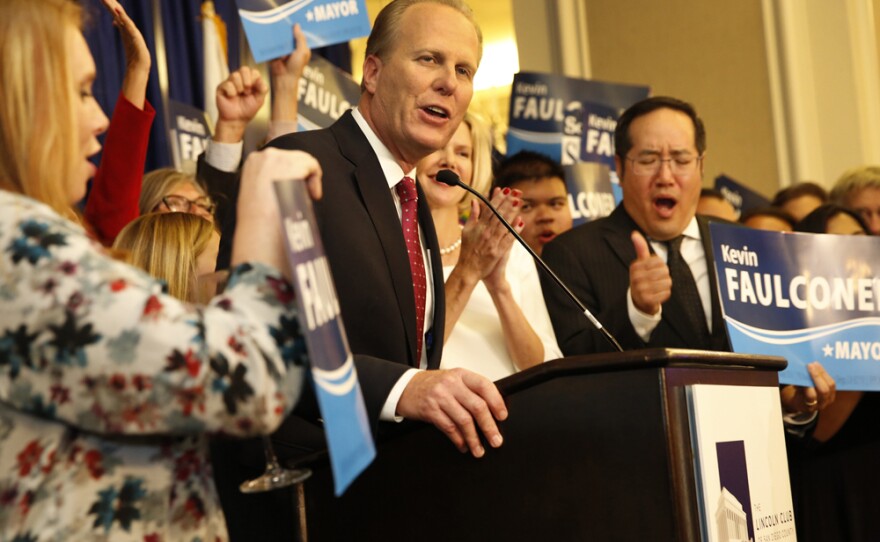UPDATE: 12:20 p.m. June 8, 2016
A group of Republican mayors on Wednesday congratulated San Diego Mayor Kevin Faulconer for winning re-election.
"Two years ago the people of San Diego elected Kevin Faulconer to clean up city government. Voters agreed with his record and vision for 'One San Diego' and rewarded him with a full term as mayor," Fort Worth, Texas Mayor and Community Leaders of America Chairwoman Betsy Price said in a statement. "On behalf of the nation's conservative mayors, I congratulate our colleague and friend on his re-election as mayor of California's second, and the nation's eighth largest city."
The Virginia-based Community Leaders of America is the home to the national caucus of Republican mayors and city council members. It was formed in response to the lack of a unified national strategy supporting Republican candidates at the local level.
UPDATE: 5:45 a.m. June 8, 2016
Kevin Faulconer was preparing for another term as mayor of San Diego on Wednesday after receiving 58 percent of the vote. Faulconer, who won a special election in February 2014 to replace the resigned Bob Filner, bested independent Lori Saldaña and Democrat Ed Harris.
"The fact that we did so well in every single portion of this city only reaffirms what we have been doing over the last couple years, which is bringing this city together, bringing all neighborhoods together as one San Diego, and ensuring that we're giving everybody their fair share of city services," Faulconer told supporters.
"It's not about Republican, Democrat or independent, it's what's the right thing we should be doing for San Diego," he said.
While Faulconer was thought to have an advantage over his rivals, an increase in Democratic voter registration in San Diego raised the question of whether he could muster enough support to win reelection outright or be forced to a November runoff. The incumbent is a Republican, while Harris is a Democrat and Saldaña is a former Democrat running as an independent in the technically nonpartisan race.

Harris, who leads the city's lifeguard union, filled Faulconer's seat on the City Council by appointment for about eight months.
"We raised a lot of issues that are important to San Diego," Harris told KUSI. "We moved some things forward — 9-1-1 times, infrastructure and we all live in San Diego, we love San Diego, and so hopefully we raised the issues that are important to people, and those are things that hopefully will be focused on a little bit more."
Saldaña, who served in the Assembly from 2004-2010, posted a message on her campaign's Facebook account thanking her supporters.
As is typical in a race with an incumbent, the election was a referendum on Faulconer's performance over two-plus years.
While he boosted municipal services during good economic times and devoted more money to badly needed road repairs, he caught flak from Chargers fan groups for refusing to endorse, or oppose, the team's plans to build a downtown stadium and convention center annex. The leaders of the groups contend the mayor is beholden to downtown hotel owners who would rather expand the convention center at its current site.
Faulconer also faced recent criticism for staffing shortages among San Diego police dispatchers that resulted in sometimes long delays for 911 callers. His budget for the upcoming fiscal year proposes spending $652,000 to hire additional dispatchers.
UPDATE: 12:30 a.m. June 8, 2016
Two late entries in the mayor's race could not stop Republican incumbent Kevin Faulconer from winning re-election as San Diego's mayor. He captured 60 percent of the vote, easily defeating independent Lori Saldaña and Democrat Ed Harris.
Read his thank you speech below, and his reiteration that he won't endorse Republican Donald Trump for president.
UPDATE: 11 p.m. June 7, 2016
With 30 percent of the precincts reporting, San Diego Mayor Kevin Faulconer is winning with 61 percent of the vote. Independent Lori Saldaña is at 20 percent, and Democrat Ed Harris at 19 percent.
UPDATE: 10:15 p.m. June 7, 2016
San Diego Mayor Kevin Faulconer, confident that he has been re-elected, appeared before a cheering crowd at the U.S. Grant Hotel and offered a slew of "thank yous." He thanked his family, his political consultants, his volunteers, and more.
The speech was brief and he ended it with this message: "I can’t wait to be your mayor for the next four years. San Diego, the best is yet to come."
With 16 percent of the votes counted, he had 62 percent of the vote. He only needed a majority to win.
Moments after speaking to his supporters, he talked to KPBS. "I’m excited, and I’m very humbled," he said.
His commanding victory was "an affirmation of working together" to solve the city's problems, said Faulconer — repeating a theme he has focused on throughout the campaign.
It's not certain yet if Democrat Barbara Bry will win the City Council District 1 seat outright Tuesday night, but if she does that would mean the Democrats will maintain their 5-4 majority on the council. Bry has just under 50 percent of the vote in the district, followed by Republican Ray Ellis with 33 percent.
As a Republican, Faulconer was asked how he felt if the Democrats remain the majority. He was typically diplomatic. "Working collaboratively is what defines us as San Diegans," Faulconer said, whether it's increasing library hours, improving public safety or paving roads.
"You work with the council," he said. "It doesn’t matter whether I’m a Republican or a Democrat."
His philosophy, he said: "Let’s put partisan differences aside and do what’s best for San Diego."
Faulconer also suggested that politicians at the national level could learn something from how San Diego operates. He also said he didn't vote on Tuesday for presumptive Republican presidential candidate Donald Trump. "I haven't endorsed him," he added.

UPDATE: 8:05 p.m. June 7, 2016
As expected, San Diego Mayor Kevin Faulconer is crushing his opponents in early election returns. Faulconer has 62 percent of the vote with about 14 percent of the vote counted. Independent Lori Saldaña has 20 percent to Democrat Ed Harris' 19 percent.
If Faulconer stays above 50 percent — and it looks like he will — he will be re-elected mayor Tuesday night.
Original post:
For much of 2015, San Diego Mayor Kevin Faulconer looked to be coasting to re-election. His relative popularity and formidable fundraising scared away the most logical Democratic challengers to the Republican mayor. The autumnal candidacy of Gretchen Newsom, a local union worker and community leader, lasted a brief seven weeks.
Then in late January, life was breathed into the race when former Assemblywoman Lori Saldaña declared her intention to challenge Faulconer. Saldaña, once a Democrat and now an independent, acknowledged the odds were against her. At times her candidacy seemed less about winning and more about forcing the mayor to defend his record in a competitive campaign.
That competitiveness increased with the entry of Ed Harris, a city lifeguard sergeant and former interim city councilman, into the campaign.
Harris also recognized the uphill battle of running against an incumbent mayor in a mid-year election with typically low voter turnout — especially among Democrats. But a host of circumstances led Harris to see a path to victory: rising voter registration, a competitive Democratic presidential primary, the divisiveness of presumed GOP presidential nominee Donald Trump and a string of negative headlines relating to San Diego's 911 dispatcher shortage.
Much of Harris' and Saldaña's campaigning played on speculation that Faulconer would leave the mayor's office to run for governor of California in 2018. Faulconer eventually put that speculation to rest, pledging categorically to serve a full four years as mayor.
Faulconer has deflected much of the criticism from his opponents and maintains San Diego is better off today than it was when he became mayor in a special election in February 2014. He replaced Democrat Bob Filner, who was forced from office in his first year amid a sexual harassment scandal.
Faulconer's signing of the city's ambitious Climate Action Plan, outreach to Latino voters and focus on road repair earned him an endorsement from The San Diego Union-Tribune.
Several challenges the city is facing remain unresolved: the Chargers stadium saga — arguably the highest profile issue of his two years in office — the city's massive infrastructure backlog and its struggle to recruit and retain police officers. Harris and Saldaña have seized upon all of Faulconer's perceived weaknesses.
Still, a scenario in which their low-budget campaigns deprive Faulconer of an outright victory on Tuesday — that would happen if he doesn't receive more than 50 percent of the vote — would be a rare achievement in local politics.








